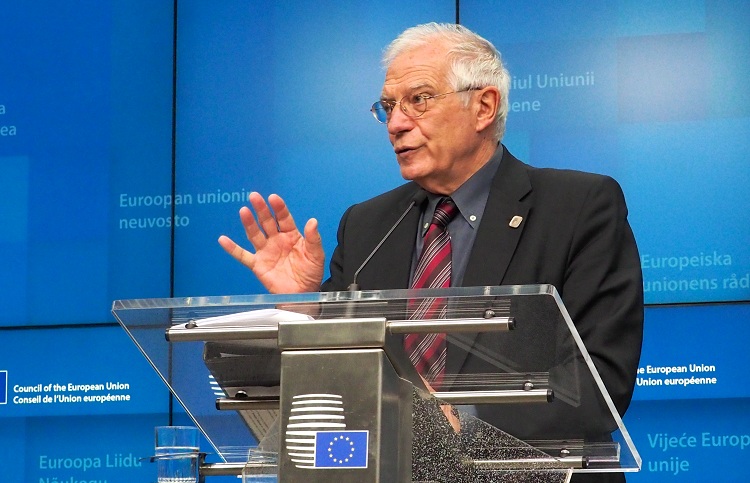The Diplomat
The European Union’s High Representative for Foreign Affairs, Josep Borrell, will be in Cuba for the first time since he took up his post, from the 25th to the 27th, to take part in the structured dialogue that Havana is holding with Brussels, according to his spokesman, Peter Stano, who confirmed yesterday.
As Spanish Foreign Minister, Borrell has already been in Havana in 2019, first to prepare for the visit of the King and Queen of Spain, and then in November, accompanying Don Felipe and Doña Letizia, but this will be the first time he will do so as head of European diplomacy to try to revitalise the Political Dialogue and Cooperation Agreement signed between Havana and Brussels in December 2016, which has produced very unsatisfactory results.
The High Representative will co-chair the joint council of the Agreement, which establishes regular meetings between both parties, with the Cuban Minister of Foreign Affairs, Bruno Rodríguez, who was already his interlocutor when he travelled to Havana as a member of the Spanish government.
Borrell and Rodríguez met again in Brussels, just over two years ago, at another meeting of the Agreement’s joint council and, since then, they have had several verbal confrontations, especially when the Cuban foreign minister “energetically” rejected the High Representative’s statements in which he called for the release of people detained on the island after the anti-government protests of 11 July 2022. Rodríguez said at the time that the EU “lacks the moral authority to make value judgements on the Cuban reality”.
According to Stano, the visit will be an opportunity to take stock of the bilateral relationship, as well as to discuss regional and global issues of mutual interest, reports Efe.
Furthermore, the spokesman pointed out that Borrell’s visit also forms part of the EU’s activities to bring the EU closer to the countries of Latin America and the Caribbean on the eve of the next summit between the EU bloc and the Community of Latin American and Caribbean States (CELAC), which will take place in Brussels on 17 and 18 July, under the Spanish Presidency.
Peter Stano also indicated that Cuba has an important voice among the developing countries as it holds the temporary presidency of the Group of 77 and China (G77+China).
Brussels assures that the EU maintains a “critical but constructive engagement” with Cuba, with “open and frank” exchanges on issues in which they have common interests, such as sustainable development and the fight against climate change.
At the same time, also on other important issues where views “differ”, such as human rights and fundamental freedoms and, since last year, also Russia’s war against Ukraine, Stano said.
According to the spokesman, the official programme of Borrell’s visit will include meetings with Cuban authorities, the EU business community on the island, Cuban entrepreneurs and “diverse voices from Cuban society” who will share their perspectives on Cuba’s challenges and opportunities.
There was no clarification, however, as to whether the High Representative’s agenda will include contacts with some of the most prominent dissidents from Castroism living on the island, who would like to be able to talk to him.
Meanwhile, the Cuban dissident platform DFrente, which brings together different Cuban opposition leaders and groups inside and outside the country, urged, in an open letter to the EU on the occasion of Borrell’s visit, to demand that the Castro government “initiate a process of political reforms” in accordance with “the new realities” of the country.
For its part, the Council for Democratic Transition in Cuba (CTDC) asked Borrell in an Open Letter yesterday that, during his visit to Cuba, the premises on which the Political Dialogue and Cooperation Agreement is based be discussed “in a diplomatic perspective of engagement with the Cuban people, and not of confrontation”.
These premises, the letter explains, “are based on the commitment of the parties to respect for citizen sovereignty, which presupposes the recognition of an autonomous conception of civil society, and respect for human rights” and, furthermore, it expresses: “We do not therefore want the Agreement to be cancelled; we only advocate, with clarity, that it be complied with”.
In the document, the CTDC points out as a priority the freedom “of political prisoners and prisoners of conscience in Cuba, with an in-depth analysis of Cuban criminal legislation” and decides to take “the opportunity to highlight once again the Amnesty and Decriminalisation of Dissent Bill that we made public on 28 March 2022. From then until now, this demand has been gaining strength and has been raised by both the European Union and the Vatican”.
The Political Dialogue and Cooperation Agreement between the EU and Cuba marked the end of the EU’s so-called “common position” towards Cuba, promoted above all by the Spanish government of José María Aznar, which since 1996, linked any progress in bilateral relations to progress in democratisation and human rights on the island.
The new Agreement entered into force in November 2017, but it is still being applied provisionally because one of the member states -Lithuania- rejected it in its Parliament.
The text promotes cooperation for sustainable development, democracy and human rights, as well as the possibility of finding shared solutions to global challenges through joint actions in multilateral fora.







